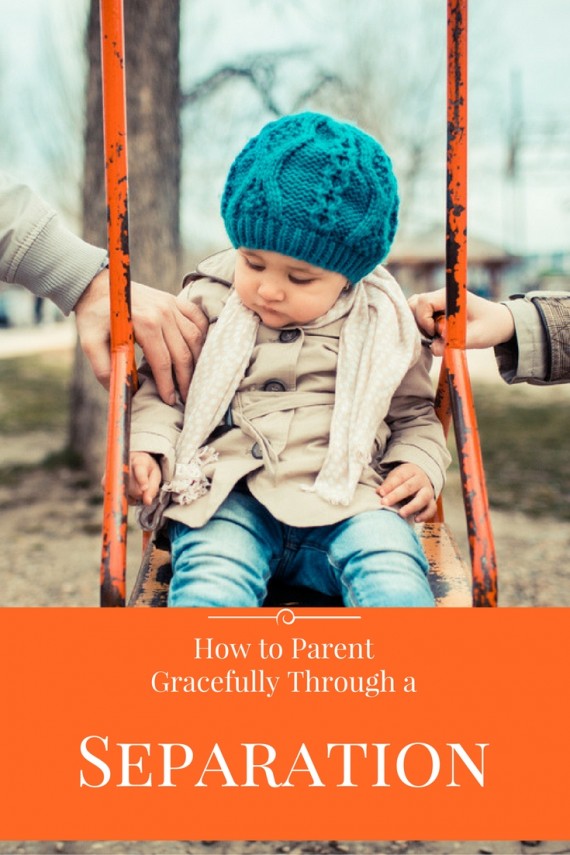I just want to start off by saying that although I have gone through a separation, I am by no means an expert. These are some general suggestions for parents who are trying to navigate their way through a separation or divorce with the goal of co-parenting as effectively as possible, and staying out of court. This is definitely not a substitution for legal advice, but I will touch briefly on a few ways to help minimize conflict while supporting your children in adjusting to these major changes.
When emotions are running rampant, and there are so many unknowns, working out the details of how to make it work can be extremely overwhelming. An important step to tackle together will be working out a parenting plan , as part of your separation agreement. For support with this, a mediator can be very helpful, as a neutral third party. Come prepared with an outline of the specific things you want included and take time to consider both sides carefully. These decisions should not be rushed, however, keep in mind that you can agree to revisit this document after a specified time period or as needed, to make any necessary changes or updates.
These decisions should not be rushed, however, keep in mind that you can agree to revisit this document after a specified time period or as needed, to make any necessary changes or updates.
This will obviously be a difficult and emotional time for both parents. I urge you to reach out for support for yourself to help you through this transition. Take advantage of your employee benefits if you have them, to connect with a professional you can talk to. It will all be completely confidential. (If you have coverage for massages, take advantage of those too!) If you don’t have benefits, you may be able to find some free or low-cost services in your area. This is where I urge you to be brave enough to reach out for support. It doesn’t mean you aren’t strong enough to handle it on your own. It just shows that you recognize the importance of doing everything you can to look after yourself in order to be the best parent you can be.
Don’t write off the simple things like trying to get a good night’s sleep, having a trusted friend you can confide in and vent to and making sure you are eating regular meals. And also, taking some time for yourself to process what you are going through. Journaling could be helpful for you, or maybe going for a run, relaxing in the tub, or taking your mind off things for a bit by diving into a good book. Take care of yourself as best you can.
Please know that you don’t have to hide your emotions from your children. Sometimes you may have to pull your shit together and be strong for them, but don’t feel like you have to wear a mask that everything is great all the time. They will see right through that, anyway. If they see you crying, it’s perfectly healthy to express that you are sad right now. You can reassure them that you will be okay, but that even adults cry and there is no shame in expressing your feelings.
Don’t make the mistake of using your children as your support or your messenger.
Don’t make the mistake of using your children as your support or your messenger. It is not their job and can be very confusing and stressful for them. Do not ever vent to your child about the other parent. It is completely inappropriate and can be very damaging. Even if the other parent is legitimately an asshole, you should never, ever say anything negative about them in front of your children. EVER. This can be extremely hard when you’re upset and angry but it is your responsibility to have respect for your children’s parent, even if it’s the last thing you feel. Underhanded comments totally count too. Children catch on to all of this and it’s completely unfair for them to have to witness.
While keeping it age appropriate, you can say things like, “Mommy and Daddy don’t agree right now and we are angry at each other, but we are not angry at you. It’s an adult problem that has nothing to do with our kids and we are trying our best to deal with it. We still love you so much and you can always talk to us about how you’re feeling. We know it’s really hard, buddy.”
Children cope with separation in different ways. Some may visibly act out while others may internalize their struggle to understand the changes. Children often blame themselves, which is definitely something to be aware of. They may need a great deal of reassurance. Make sure your child knows that all of their feelings are normal and it is safe to express them with you. As tempting as it can be, don’t ever give them false hope that you might get back together. Do be sure to validate their feelings. “I can see you’re really angry. I know this is super hard.” “I know you wish we could all live together. I can see how upset you are about it.” There are some great books and online resources to help guide you through supporting your child. Don’t hesitate to reach out for community services to help your child through this transition as well. It can also be helpful to communicate what’s going on with their teacher or other supportive adults in their life.
During this time, you might want to stay off social media. Don’t ever give in to the urge to post about the details of your separation or post negative things about the other parent
During this time, you might want to stay off social media. Don’t ever give in to the urge to post about the details of your separation or post negative things about the other parent. It’s totally inappropriate and trying to win your friends over to “your side” is just gross and makes you look bad. Find a private group or forum where you can get support from other parents going through similar situations.
Another challenge is when things get heated in phone calls or text messages. I’ve learned that it’s often best to put the phone down and delay your response. Getting into name calling and falling into the trap of texting wars is a vicious cycle. You often think if you just send this one last message, he or she will have this epiphany and finally see that I’m right and they are wrong. Yeah, that’s not going to happen. They might never see your side and calling them a pathetic piece of shit isn’t going to help the situation. You both end up getting riled up and saying things that just don’t get you anywhere. Sometimes you just have to agree to disagree. If you’re really having a hard time being civil to each other, try to limit the communication to only what is necessary. Ignore the snarky text, as tempting as it is to reply with a witty, perfectly worded response. If it’s not regarding the kids, just disengage. Sounds so easy, right?
You are also going to have to learn to accept that you just can’t control what the other parent does. They are going to make decisions that you may not agree with. They may have different rules for the kids at their home and this might drive you absolutely insane, but at the end of the day, does it really matter? Are the kids’ needs being looked after? Are they safe and well cared for? That is what matters. So their bedtime is later than you wish for it to be or they get more screen time than you would give. Or they’re allowed to do the thing that you would never let them do. Ideally, your kids will have similar expectations in both homes, but they will also adjust to the differences.
Every situation is different and there is no one-size-fits-all solution. At the end of the day, the best thing you can do is take care of yourself, put a good support system in place for you and your children, and have faith that it does usually get better in time.
What other suggestions do you have for co-parenting?
Pin for Later:

*Opinions expressed are those of the author, and not necessarily those of Parent Life Network or their partners.




 Sponsored
Sponsored



